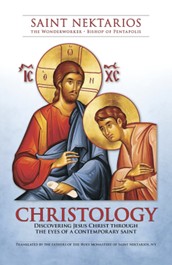Christology- St Nektarios of Pentapolis
Saint Nektarios of Pentapolis, in his preface to Christology, writes that: “Our chief aim in compiling the book… was to strengthen the faith of Christians; so they may become firm and immovable in the faith, live worthily of the Gospel of Christ, being frightened in no way by the adversaries (Philippians 1:28); that they may live soberly, righteously, and godly in this present world.”
This book does what Saint Nektarios sought for it to accomplish. First published in Greek in 1900, it has lost none of its relevance for a contemporary Western audience.
In Christology, Saint Nektarios expounds on the reasons for Christ becoming incarnate and human. The first part of the book deals with the expectation among all of humanity, and not just the Israelites, for the coming of a Saviour. In doing so, he makes use of various mythologies including Greek, Egyptian and even Asian. This use of extra-biblical sources such as histories, literature, and philosophy is featured throughout the book and shows the great learning of the Saint. They also assist us in rationalising the great mystery of the Incarnation.
The second part shows us that Christ is God and Man, again providing evidence from Christian and secular sources. This part draws from both the Old and New Testaments in revealing Christ to be the long-awaited Messiah. Saint Nektarios emphasises Christ’s Divinity and the great change to humanity that occurred as a result of Christ’s earthly ministry.
The third and fourth parts of the Christology, in commenting on God’s revelation to the world and the brilliance of the Christian faith, make clear the timeless treasures of the Christian faith. It shows a practical appreciation of the beauty and the simplicity of our faith, and reinforces a fundamental understanding that the life of each Christian is centred in having a personal relationship with Christ, and in attaining virtues in His likeness.
Christology is a unique book, and is a testament to the learning of Saint Nektarios and his deep love for Christ. This love can be seen throughout the book, which allows us to better understand Christ and brings us ever closer to Him.
Source: Lychnos December 2021 / January 2022

